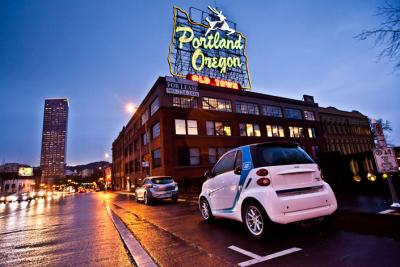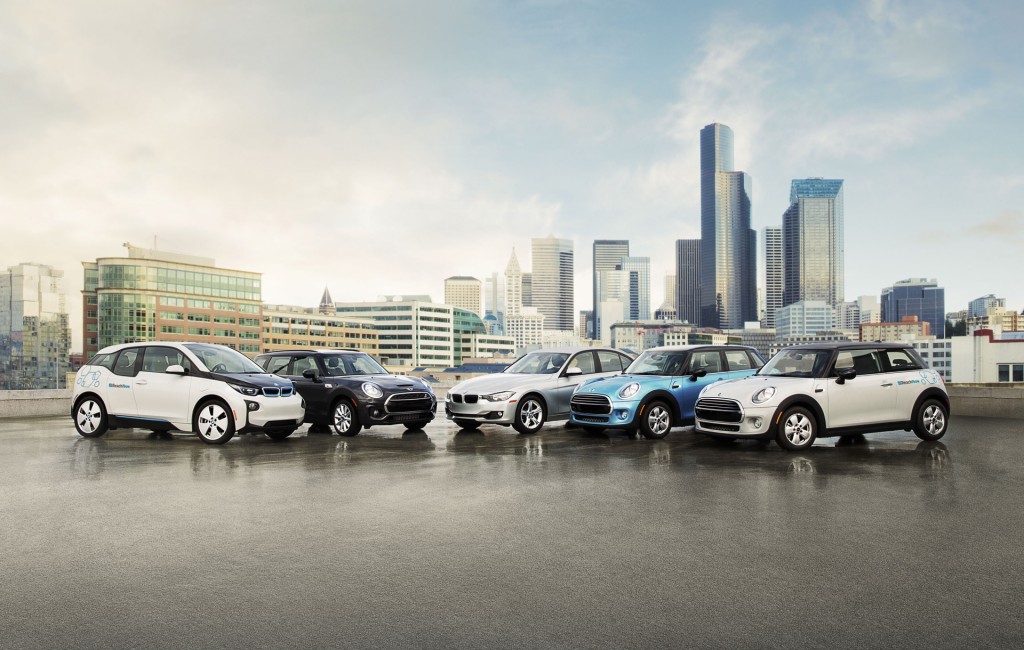Car-sharing, at least as we know it, looks likely to go down in history as a trend that went in and out with the 2010s.
With a terse announcement Wednesday, one of the biggest longtime players—the newly unified Share Now, from Daimler AG and the BMW Group—declared that it’s withdrawing completely from North America and cutting more of its European operations.
The company stated that in conjunction with its shareholders at Daimler and BMW it “has decided to exit the North American market and cease operations in London, Brussels and Florence, effective February 29, 2020.”
Meanwhile it cited low adoption rates as the reason it was discontinuing service on those three European cities.
Share Now announced in October that it was withdrawing from Portland, Austin, Calgary, and Denver by October 31 and Chicago by December 31, citing a “highly volatile” market and noting to Green Car Reports “a quickly-changing mobility landscape.”
The demand for cars to go had clearly changed. Portland and Austin had been two of Car2Go’s original launch markets, and the company in 2012 called Portland one of its strongest markets globally.

car2go - Portland, OR
With that October contraction, the company had said it was “refocusing its efforts and resources on the cities that present the clearest path to free-floating carshare success”—in New York City, Washington D.C., Montreal, Vancouver, and Seattle.
Not even the operations in those cities can apparently deal with “two extremely complicated realities” Share Now pointed to in North America—firstly, echoing a statement it made in October about “the volatile state of the global mobility landscape,” and secondly, pointing to “the rising infrastructure complexities facing North American transportation today.”
Too many challenges from ride hailing and going electric
Share Now stopped short of calling out ride-hailing, but it pointed to “a rapidly evolving competitive mobility landscape, the lack of necessary infrastructure to support new technology (including electric vehicle car share) and rising operating costs.”
To draw this to a potential conclusion and question that Share Now might not have been prepared to make: Car-sharing is going electric (as both Car2Go and Reach Now had independently said in the past), but the new company apparently isn't seeing enough upside in the hurdles involved in keeping cars charged.

BMW ReachNow
“Moving forward, Share Now will focus on the remaining 18 European cities. We, along with out shareholders, believe these markets show the clearest potential for profitable growth and mobility innovation.”
Reuters pointed to a statement made by BMW chief executive Oliver Zipse last month, that "there are potentially 'disrupting' business models that rely on car usage rather than car ownership. But they are focused on very specific areas with high population densities to ensure high utilisation rates."
The combined mobility company owns MyTaxi, which includes the Beat car-sharing app in South America, as well as other such apps.
Less focus on the environment, community... so what's the advantage over Uber?
In the U.S., the direction of car-sharing has changed over the years. Car2Go had been originally focused around utilitarian, bare-basic Smart Fortwo two-seaters—some of them electric—while BMW’s Reach Now was the more glamorous of the two, starting with BMW and Mini models and aiming toward young professionals. Car2Go later refocused to something less community-oriented, with smaller service areas and more Mercedes-Benz vehicles.
While several major academic studies have found ride-hailing services like Uber and Lyft to add to pollution concerns in major metro areas, the effect of car-sharing users has generally been that they combine it with other modes of transit like biking or public transit, with a significant drop in the number of privately owned vehicles.

Car2Go offering bike racks in Portland
Share Now isn’t the only company that’s found car-sharing to be a tough road. GM’s Maven stopped service in about half of the cities it serves earlier this year, and the service had morphed from something that was centered around car-sharing fleets of GM vehicles to a potentially confusing collection of services that included Maven Gig (like Uber ride hailing) and a service somewhat like Turo allowing owners to rent out their vehicles.
This pessimism about car-sharing viability would have been unheard of five years ago. By the middle of the decade nearly every major automaker was developing a large-scale plan for car-sharing, assuming a certain portion of its fleet might be free-floating and loaded with brand-building possibility. But today the bets are being waged toward either ride-hailing or car-subscription models.
Futurists are just as keen now as they were at the start of the decade about personal ownership going out of style in the future, but we seem just as distant as then on how exactly such a free-flowing model might work financially. Whoever figures it out is going to make a killing.
